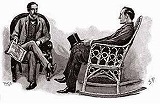SHORTLY after my marriage I had bought a connection in the Paddington district. Old Mr. Farquhar, from whom I purchased it, had at one time an excellent general practice; but his age, and an affliction of the nature of St. Vitus’s dance from which he suffered, had very much thinned it. The public not unnaturally goes on the principle that he who would heal others must himself be whole, and looks askance at the curative powers of the man whose own case is beyond the reach of his drugs. Thus as my predecessor weakened his practice declined, until when I purchased it from him it had sunk from twelve hundred to little more than three hundred a year. I had confidence, however, in my own youth and energy and was convinced that in a very few years the concern would be as flourishing as ever.
For three months after taking over the practice I was kept very closely at work and saw little of my friend Sherlock Holmes, for I was too busy to visit Baker Street, and he seldom went anywhere himself save upon professional business. I was surprised, therefore, when, one morning in June, as I sat reading the British Medical Journal after breakfast, I heard a ring at the bell, followed by the high, somewhat strident tones of my old companion’s voice.
“Ah, my dear Watson,” said he, striding into the room, “I am very delighted to see you! I trust that Mrs. Watson has entirely recovered from all the little excitements connected with our adventure of the Sign of Four.”
“Thank you, we are both very well,” said I, shaking him warmly by the hand.
“And I hope, also,” he continued, sitting down in the rocking-chair, “that the cares of medical practice have not entirely obliterated the interest which you used to take in our little deductive problems.”
“On the contrary,” I answered, “it was only last night that I was looking over my old notes, and classifying some of our past results.”
“I trust that you don’t consider your collection closed.”
“Not at all. I should wish nothing better than to have some more of such experiences.”

“To-day, for example?”
“Yes, to-day, if you like.”
“And as far off as Birmingham?”
“Certainly, if you wish it.”
“And the practice?”
“I do my neighbour’s when he goes. He is always ready to work off the debt.”
“Ha! nothing could be better,” said Holmes, leaning back in his chair and looking keenly at me from under his half-closed lids. “I perceive that you have been unwell lately. Summer colds are always a little trying.”
“I was confined to the house by a severe chill for three days last week. I thought, however, that I had cast off every trace of it.”
“So you have. You look remarkably robust.”
“How, then, did you know of it?”
“My dear fellow, you know my methods.”
“You deduced it, then?”
“Certainly.”
“And from what?”
“From your slippers.”
I glanced down at the new patent-leathers which I was wearing. “How on earth- -” I began, but Holmes answered my question before it was asked.
“Your slippers are new,” he said. “You could not have had them more than a few weeks. The soles which you are at this moment presenting to me are slightly scorched. For a moment I thought they might have got wet and been burned in the drying. But near the instep there is a small circular wafer of paper with the shopman’s hieroglyphics upon it. Damp would of course have removed this. You had, then, been sitting with your feet outstretched to the fire, which a man would hardly do even in so wet a June as this if he were in his full health.”